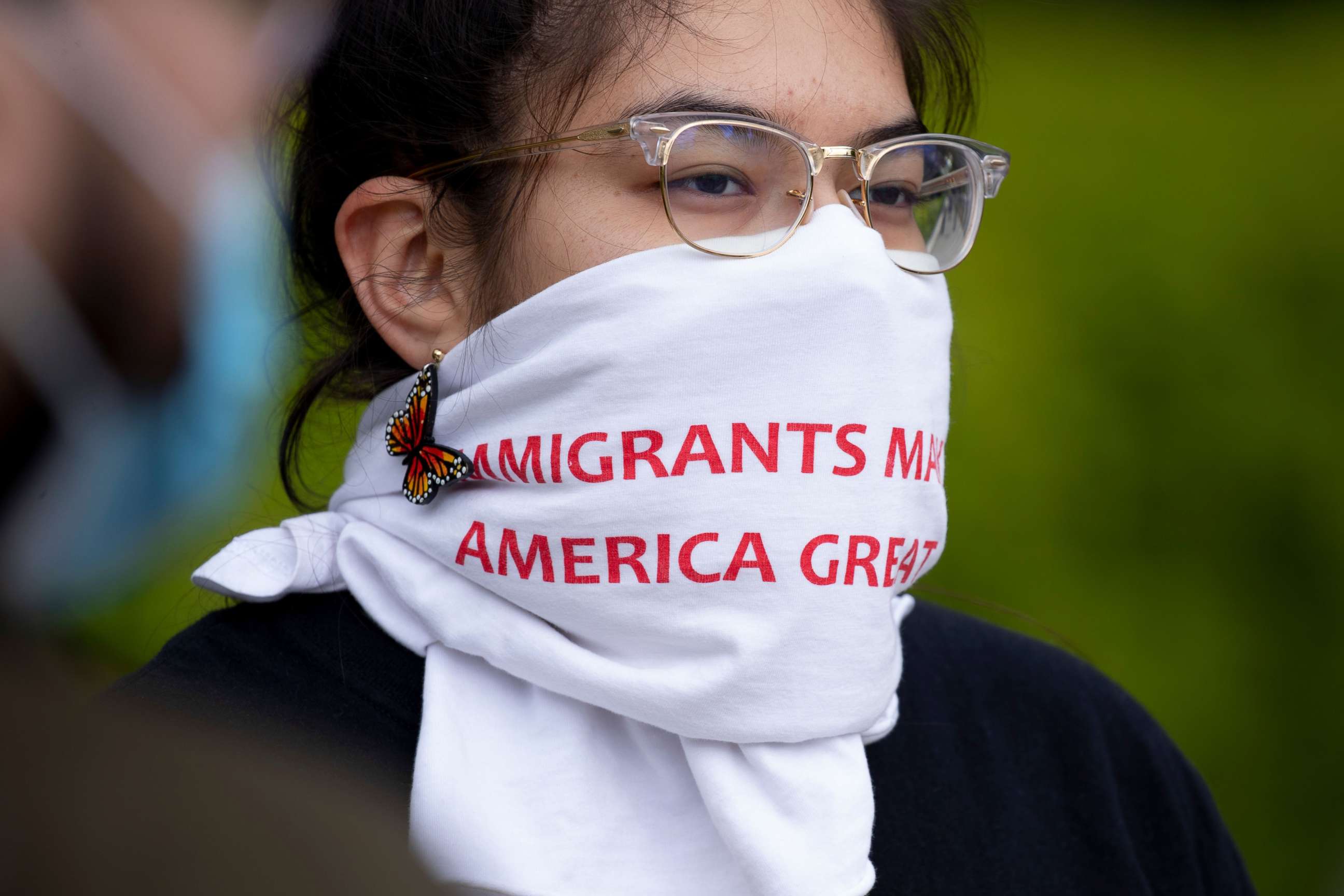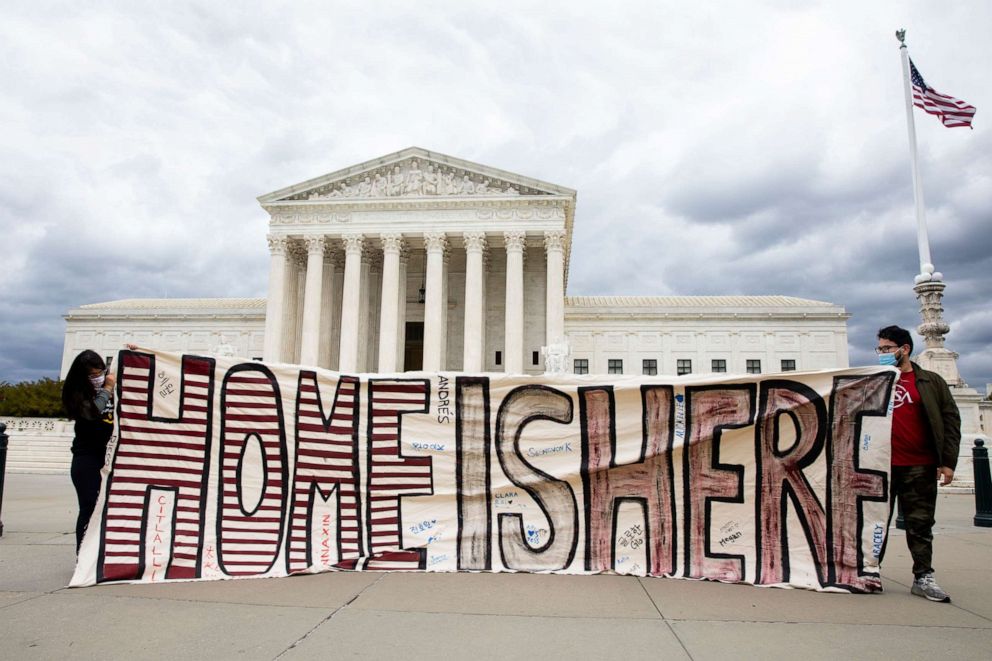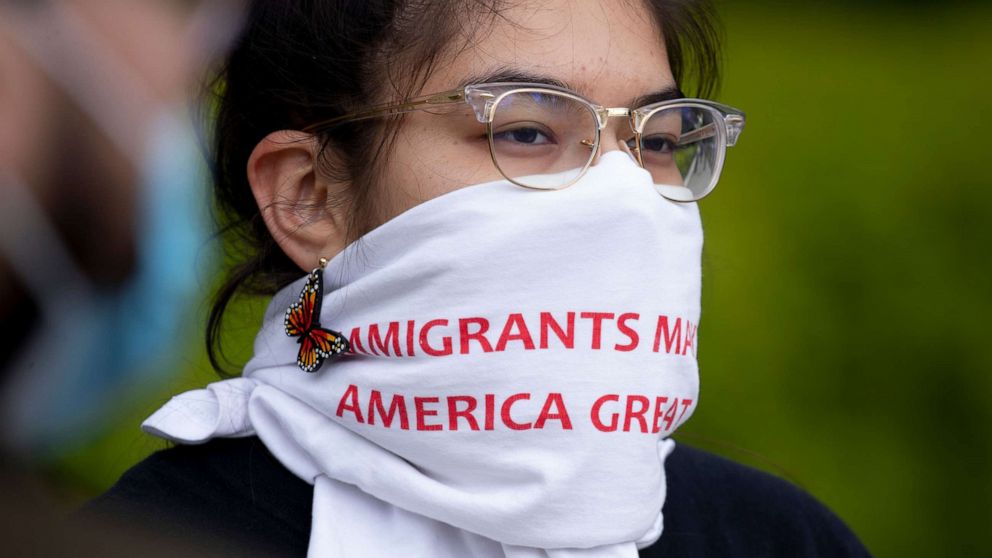DACA recipient college students stuck in political limbo without emergency cash grants
When Luz Chavez was growing up, she dreamed of someday becoming the secretary of the Department of Education, she told ABC News.
Now, a student at Trinity Washington University, her future is uncertain, as she is one of hundreds of thousands who were brought to the United States as a child and is permitted to stay in the country without risk of deportation under the Deferred Action for Childhood Arrivals policy.
Caught in the crosshairs of Washington’s partisan bickering, DACA recipients, who already don’t qualify for federal student aid, are in turn ineligible for the emergency cash grants dispersed by schools and distributed by the Education Department as a response to the COVID-19 pandemic.
Tune into ABC at 1 p.m. ET and ABC News Live at 4 p.m. ET every weekday for special coverage of the novel coronavirus with the full ABC News team, including the latest news, context and analysis.
This comes as a Supreme Court ruling looms that will decide the future of DACA – leaving these students without financial assistance amid the pandemic while their futures remain in limbo.
DACA is an Obama administration-created program that protected children of undocumented immigrants from deportation, but the Trump administration announced in 2017 it would suspend the program. The termination of the policy has been challenged in court and the Supreme Court is set to rule on the case this term.
California Community Colleges filed a lawsuit on Monday against Secretary of Education Betsy DeVos over the department’s eligibility requirements put in place for pandemic relief funds.
Last month, the Education Department announced it was distributing more than $6 billion to colleges and universities to “provide direct emergency cash grants to college students whose lives and educations have been disrupted by the coronavirus outbreak.”

The funds were approved as part of the CARES Act -- the stimulus package passed by Congress and later signed by President Donald Trump.
The Education Department followed up by releasing an FAQ, which says only students who are eligible for Title IV funding, or federal financial aid, can receive the CARES Act funding.
“The Department of Education ignored the intent of the CARES Act to give local colleges discretion to aid students most affected by the pandemic, and instead has arbitrarily excluded as many as 800,000 community college students,” said California Community Colleges Chancellor Eloy Ortiz Oakley.
“Among those harmed are veterans, citizens who have not completed a federal financial aid application, and non-citizens, including those with DACA status,” the statement continued.
The California Community Colleges system is the largest higher education system in the country and “serves an estimated 70,000 undocumented students, many of whom have DACA status,” according to a news release.
The news release added that the Department of Education also excluded students without a high school diploma or GED, and students still in high school who are participating in dual enrollment programs.
The Education Department does not comment on pending litigation, but department spokeswoman Angela Morabito said in an email that "The CARES Act clearly ties eligibility for this funding to Title IV eligibility. Congress could have chosen to include DACA students and other foreign nationals in the legislation, or granted the Department the authority to send this money to noncitizens, but they did neither of those things."
“It is absurd that special interests want the Department to fabricate a basis to send U.S. taxpayer money to non-citizens, especially given how many American students are in need of this emergency relief,” Morabito said. “States, colleges, and universities have every right to help their DACA students financially, but they cannot use U.S. federal taxpayer dollars in order to do so.”
Democratic lawmakers, Sen. Patty Murray, D-Washington and Rep. Rosa DeLauro, D-Connecticut, penned a letter in early May to DeVos, urging her to change the "harmful and unauthorized guidance that significantly restricts the flexibility for emergency financial aid to students" in the CARES Act.

“Secretary DeVos pushing DACA recipients, undocumented students and other vulnerable students out of needed relief from the CARES Act is cruel. This virus doesn’t discriminate when it comes to the students who are impacted, and our response absolutely shouldn’t either,” Murray said in a statement. “It is completely unacceptable that despite such dire need for assistance among students during this unprecedented time, Secretary DeVos has restricted emergency financial aid without any authorization. This is absolutely not what Congress intended, and Secretary DeVos must reverse this guidance immediately.”
“This whole thing just completely left out undocumented students and DACA recipients who are also students,” said Juliana Macedo do Nascimento, the state and local policy manager for United We Dream, the largest immigrant youth-led network in the country.
“We were really dismayed by it, but not entirely surprised,” she said, adding that the government “left out immigrant families through most of the CARES Act,” like mixed-status families being ineligible for the $1,200 stimulus checks and undocumented workers not qualifying for unemployment.
“So, to be left out of yet another part of the relief, the federal relief package, was really a low blow, especially because they’re college students,” she said.
Chavez is triple majoring in political science, education and sociology -- and although life during COVID-19 can at times feel like it’s at a standstill with schools closed and work-from-home orders in place across the country, homework and bills have yet to subside for Chavez, whose classes have moved online.
“As a DACA recipient, and everything going on with COVID-19 and as well with the Supreme Court ruling coming at any time -- It's been very stressful,” Chavez said, who also is a youth organizer for the group United We Dream.
“It's been a very stressful time for me, mainly because I'm also the sole provider in my home because of COVID-19.”
Chavez said prior to COVID-19, her mother worked in hospitality, while her two younger siblings worked as after school counselors, but all three of them lost their jobs due to the pandemic.
“I’m thankful to have a job right now, but I’m also very scared because DACA is the only reason I’m able to work,” Chavez said, explaining that DACA provides her protection from being deported. She said if she were eligible for the federal assistance, it could help provide food for her family and pay for things like WIFI and basic utilities.
“It would go to the basic essentials that I’m currently struggling to pay for with my job,” she said.
What to know about coronavirus:
- How it started and how to protect yourself: Coronavirus explained
- What to do if you have symptoms: Coronavirus symptoms
- Tracking the spread in the U.S. and worldwide: Coronavirus map




